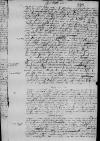Wir haben aus E(wer) H(erlichkei)t ⌊⌋ mit freuden vornom(m)en
, / das die ire gelibte ⌊tochter(r)⌋ dem edlen, ernfest(en) ⌊Albrecht(en) von ... illegible⌈...... illegible⌉ Lohendorff⌋ vermhalet zur ehe geben(n) hoth, / darzu wir in samptlich von Gote dem almechtig(en) gnad, / gluk / und heil wunschen zu lang(en) geczeiten(n). / T written over t⌈tTT written over t⌉ragen ouch kein zcweifel, das uns E(wer) H(erlichkei)t bey solcher ehefreudt gern(n) heth gesehen(n). / Weil es aber die eil der superinscribed⌈eil dereil der superinscribed⌉ zceit nicht hoth mugen fuegen, / ist E(wer) H(erlichkei)t bey uns, / und wir bey E(wer) H(erlichkei)t enschuldiget. / Nicht wynigers schicke wir ir, / E(wer) H(erlichkei)t ⌊tochter(r)⌋, / dissen tagen gemess ein kleine vorehrung, / dabey sie lerne das kreucz trag(en), / das E(wer) H(erlichkei)t mit irer ⌊mutter⌋ nicht kan abwerffen(n) etc. Noch laut der copeien, / wie E(wer) H(erlichkei)t ⌊ko(nigliche)r m(ajeste)t⌋ geschriben(n), / hab wir nichts uns in unserm(m) schreibn(n) lossen merk(en), / weil uns nicht wil geburen / von arendn(n)n und andren hendlen E(wer) H(erlichkei)t befholen(n) / zu wissen(n) etwas anzubreng(en). / Was on the margin⌈WasWas on the margin⌉ aber die(?) unser privilegien anghet superinscribed in place of crossed-out halben(n)⌈halben(n) anghet anghet superinscribed in place of crossed-out halben(n)⌉ ein vorczog biss uff negst zukunfftige ⌊tagfart⌋ zu bitt(en), / hoth uns nicht unbillich bedunckt, uff welcher uns allen, / die das ⌊lant⌋ mit trewen(n) ... illegible⌈...... illegible⌉ menen(n) / vil wil superinscribed in place of crossed-out vil⌈vil wil wil superinscribed in place of crossed-out vil⌉ zu bedencken(n) sein, / ouch darzu zuthun so vil umer muglich etc. Es ist ouch gestrigs tags E(wer) H(erlichkei)t diner von der ⌊Wilde⌋ widerkomen(n), / dem wir ein frischen klepper / im hinzcoge mitgegeben(n), / sein war im hinkend word(en). / Was der uns von ⌊i written over k⌈kii written over k⌉unger ko(nigliche)r m(ajeste)t⌋ vor ⌊⌋ mitgebrocht, / wirt E(wer) H(erlichkei)t aus beygelegt(en) brive vornemen(n), / und ... illegible⌈...... illegible⌉ was darinnen geschribn(n) vertraulich halt(en) und uns widerzuschick(en). / D written over d⌈dDD written over d⌉er h(er) ⌊Vlossek⌋ ⌊⌋ uns ouch mit grossen erbitten on the margin⌈mit grossen erbittenmit grossen erbitten on the margin⌉, / dergleichn(n) ⌊ko(nigliche)r m(ajeste)t⌋ secretari(us), h written over M⌈Mhh written over M⌉er(r) ⌊Mathias von Macolim⌋, / des superinscribed in place of crossed-out welchen⌈welchen des des superinscribed in place of crossed-out welchen⌉ ⌊⌋ wir E(wer) H(erlichkei)t ubersenden(n), / von wegen der zceitung(en) die uns geschribn(n). Wir sein ouch alle stunden unsers botn(n) von ⌊Krako⌋ gewertig on the margin⌈gewertiggewertig on the margin⌉, der den(n) fumfft(en) tag des negst(en) vorschinen monts von uns abgefertiget. / Was der wirt mit sich haben(n), / wolle wir dan(n) berihtn(n) E(wer) H(erlichkei)t, / die wir in langweriger(r) gesuntheit und wolfart gotlichn(n) gnad(en) befelen(n), / mit den erst(en) nicht vorhalt(en). /

 BCz, 245, p. 295 (t.p.)
BCz, 245, p. 295 (t.p.)